How to Sleep with Hip Pain at Night
Got hip pain?
This article covers everything to know about hip pain at night, including the symptoms, causes, and tips for sleeping.
Related Articles
- How to Sleep with Hip Pain at Night
- The Best Hip Pain Exercises
- The Ultimate Guide to Sleep
- Sleep Tips and Tricks
Hip pain is a common problem that can interfere with sleep and make it difficult to function during the day—about 20% of people over 65 report chronic hip pain.
The severity of pain may vary. Some research indicates that 14.3% of adults reported significant hip pain on most days over the previous six weeks.
This article provides a comprehensive overview of hip pain at night, including causes, symptoms, prevention, and treatment options.
Causes of Hip Pain at Night
Hip pain has several possible causes, some occurring much more often than others. Possible causes include the following:
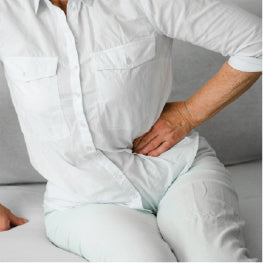
Arthritis
Osteoarthritis of the hip involves degeneration and inflammation of the hip joint. It is one of the most common causes of hip pain at night. Sleeping with hip pain due to arthritis can be challenging. Estimates are that 80% of people with arthritis have trouble sleeping. Additional symptoms of arthritis include stiffness and decreased range of motion.
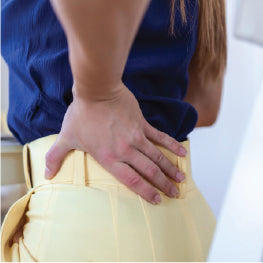
Bursitis
Bursitis involves inflammation of the bursa, the fluid-filled sac that reduces friction between the hip bone and soft tissue. It can commonly occur from an overuse injury, such as running. Pain from hip bursitis is often worse at night, making sleeping difficult.
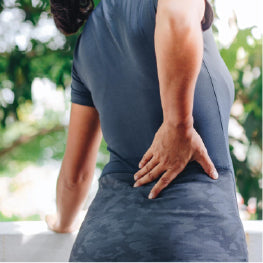
Tendonitis
Tendonitis is inflammation of the tendons surrounding the hip joint. Similar to other joint inflammations, it can cause hip discomfort when sleeping.

Muscle Strain
A muscle strain from overuse or injury can cause pain in the muscles around the hip joint. Overuse injuries can occur from repetitive movements, such as jumping, dancing, and running.
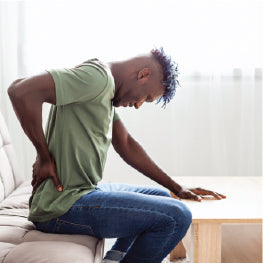
Sciatica
Sciatica pain can develop for a variety of reasons. It involves irritation or inflammation of the sciatic nerve that runs down the back of the leg from the lower back. One common cause is a pinched nerve in the spine. Pain can also radiate to the hip.
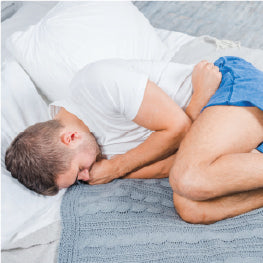
Sleeping Position
Certain sleep positions can affect the body's alignment, which may lead to pain at night. For example, According to the Arthritis Foundation, side sleepers are particularly susceptible to hip pain at night because it can put pressure on your hip joint. Sleeping on the back can also cause the back to arch, which may compress the nerves and lead to hip pain.
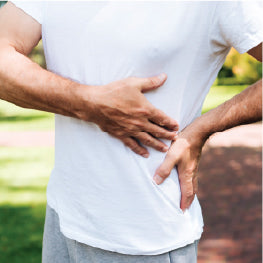
Injury
Different types of hip injuries, such as those caused by a fall or trauma to the hip, can also lead to hip discomfort at night. Common hip injuries include a hip labral tear and a hip flexor strain.
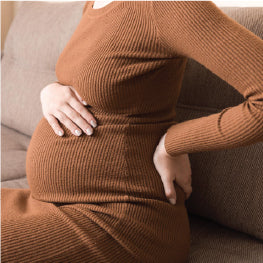
Pregnancy
During pregnancy, the body releases certain hormones that help the connective tissue relax to prepare for labor. This may cause the ligaments and joints between the pelvis to loosen and lead to hip pain. The associated weight gain in pregnancy can also cause hip pain at night, especially during the third trimester.
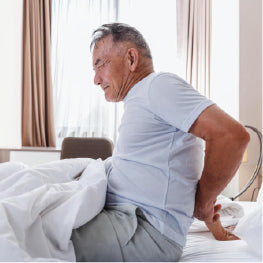
Mattress and Pillow
A mattress and pillow that does not provide the proper support to keep your body in the correct alignment can also worsen hip pain.
Symptoms of Hip Pain at Night
Symptoms of hip pain at night can prevent someone from finding a comfortable sleep position and getting a good night's rest. It can lead to daytime sleepiness and being less active. When someone feels sleepy during the day, they may also not tolerate pain as well, which leads to a cycle of pain interfering with sleep.
Symptoms of hip pain at night include:
- Pain in the hip or groin
- Pain may radiate to the back
- Difficulty falling or staying asleep
- Tossing and turning, trying to find a comfortable position
- Stiffness in the hip joint
- Pain that worsens with activity
Prevention
Certain factors associated with an increased risk of hip pain, such as age and genetics, are not controllable. But there are steps someone can take that may prevent or reduce the risk of hip pain at night, including:

Get to and maintain a healthy weight
Extra weight can place stress on the joints and increase the risk of hip pain. Getting to and maintaining a healthy weight can help reduce discomfort.

Exercise Regularly
Regular exercise can help strengthen the muscles around the hip and improve flexibility and range of motion. For instance, one study found a 12-week exercise program for people with arthritis improved hip extension range of motion by 30%.

Avoid tasks or activities that lead to an overuse injury
Although exercise is helpful, avoid or limit activities that lead to overuse injuries and hip pain.

Maintain good posture
Good posture helps keep your hips aligned and decreases stress on the hip joints. Try to be aware of posture throughout the day, including while sitting.
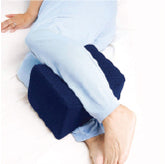
Use a supportive mattress and pillow
A supportive mattress and pillow can help keep your spine in correct alignment. A firm mattress may work best.
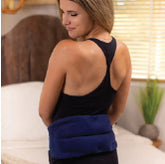
Apply Ice or Heat
Ice may reduce inflammation and pain. Heat may also promote blood flow to the area and improve pain.
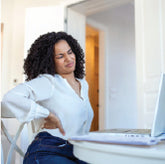
Avoid sitting for extended periods
During the day, try to get up and move around for a few minutes every hour. Sitting too long may place added stress on the hip joint, which can worsen hip pain at night.

Stretch Regularly
Stretching can help improve flexibility in the hip joint and alleviate stiffness and discomfort. Examples of hip stretches include a hip flexor stretch, piriformis stretch, and butterfly stretch.
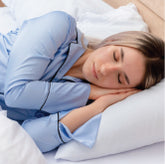
Avoid Sleeping on Your Side
Sleeping on the side can worsen hip pain. If possible, try to sleep on your back or stomach.
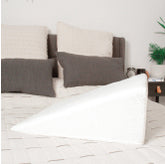
Consider a Wedge Pillow
A wedge pillow can help lift the thighs while sleeping on the back. This changes the angle of the pelvis and may reduce pressure on the hips.
Treatment
Home treatment for hip pain at night may vary depending on the cause and how long the pain has been going on. For instance, some studies found that conservative non-surgical treatment for hip arthritis was successful 47% of the time.
Treatment aims to reduce symptoms and improve sleeping with hip pain. It may include a combination of medication, lifestyle changes, and sleep positions to alleviate hip pain.
Treatment may include the following:
- Pain relievers: Pain relievers can include over-the-counter medications, such as acetaminophen or ibuprofen, that can decrease pain and inflammation. Stronger medications, including narcotic pain medications, should be taken with caution since they can have significant side effects.
- Physical therapy: Physical therapy for hip pain can include exercises, heat, ice, TENS therapy, and ultrasound to reduce pain, strengthen the muscles around the hip, and improve flexibility.
- Corticosteroids: Corticosteroids are injections into the hip to decrease inflammation. Injections are often helpful. Studies show that 75% of people had improved symptoms of hip pain at one month. Also, 33% of people maintained a good response at three months.
- Surgery: In some instances, surgery may be needed to repair damage to the hip. The exact type of procedure varies depending on the cause of hip pain.
When to See a Doctor
Delayed treatment for hip pain at night can lead to further damage to the hip joint and decreased range of motion and mobility. It is essential to see a doctor in the following situations:
- Hip pain is severe or becomes worse
- Hip pain is accompanied by redness, fever, and swelling
- You have difficulty walking or moving your hip
- Home remedies did not relieve the hip pain
- You have unintentional weight loss
- You experience night sweats
- You have a history of cancer
Additional Considerations
There are a few additional things to consider when assessing and treating hip pain at night, such as:
Side Sleeping and Hip Pain
Side sleeping can cause hip pain at night or make sleeping with hip pain more difficult. If you cannot sleep on your back, consider placing a pillow between your knees to help align your hips when sleeping on your side.
Hip Pain at Night and Hip Replacement
In some cases, such as osteoarthritis, a hip replacement may be the best option for treating hip pain. Usually, doctors suggest more conservative treatment first. But some signs it may be time to opt for a hip replacement include:
- Hip pain that interferes with sleep
- Having to change social activities due to hip pain
- Inability to climb stairs or perform activities of daily living
If the pain becomes severe enough that other treatments do not help, talk to your doctor about hip replacement surgery.
The Importance of Good Sleep Hygiene
Good sleep hygiene practices can help improve the overall quality of sleep. They may help you fall asleep and stay asleep. This may significantly help if pain is mild to moderate and good sleep hygiene is paired with other home treatments.
Consider some of the following tips for better sleep:
- Try to maintain a consistent sleep/wake schedule.
- Having a relaxing routine before bed.
- Avoid using electronics before bed since the light can trick your brain into thinking it's daylight.
- Create an optimal sleep environment, usually a cool, dark, and quiet space.
- Avoid heavy meals or alcohol before bed.
Conclusion
Hip pain at night can be frustrating and lead to decreased quality of sleep that impacts daily life. When it comes to what causes hips to hurt at night, it can be a variety of conditions, including arthritis, injury, and sleep position.
Fortunately, there are several things you can do to treat the condition. Medication, stretches, heat, and cold may help.
If pain in the hip becomes severe or does not improve with home treatment, it is best to see a doctor to get a diagnosis and treatment plan.
About the Author

MaryAnn DePietro CRT is a licensed respiratory therapist with over 15 years of clinical experience in critical care, emergency medicine, and pulmonary rehabilitation. She is also an American Council on Exercise certified personal trainer and holds specialty certifications in orthopedics, senior fitness, and weight management. MaryAnn has a degree in Rehabilitation from Penn State University and a degree in respiratory therapy.
In addition to her clinical experience, she has written extensively about all things medical, as well as health, fitness, and aging for various websites, magazines, and newspapers.
About Carex Health Brands
Carex is your one-stop shop for home medical equipment and for products that assist caregivers with providing the best possible support and care for their loved ones. Carex Health Brands has been the branded leader in in-home, self-care medical products for over 35 years. Our goal is to improve the lives of our customers by bring them quality products that bring dignity back to their lives. With our three nationally distributed brands, Carex Health Brands serves national, regional and independent food, drug and mass retailers along with wholesalers, distributors and medical dealers.

